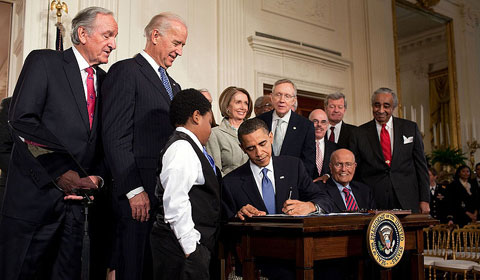Obama’s Legacy: A Tougher FDA and the Device Tax
It’s a fair bet that President Obama does not owe his reelection to anyone or any entity in the medical device industry. That means his administration has few favors to return, as it faces an unprecedented revolt from the industry in the form of an 805-signature November 13 letter to congressional leaders urging repeal of Obamacare’s 2.3% excise tax on medical device gross sales beginning January 1. An online petition located at http://no2point3.com has gathered more than 9000 signatures.
December 8, 2012

The Congressional Budget Office estimates that the tax is expected to generate $29-billion within a decade. It remains a possibility that the tax is repealed or its implementation date postponed.
Obama signing the Patient Protection and Affordable Care Act at the White House in 2008. Image from Wikipedia. |
The rationale for the new tax is the administration’s belief that Obamacare will generate new sales revenues for a number of industries—not just device makers—that will therefore be well able to afford to pay it. Affected industries, including hospitals, health insurance firms, home health agencies, drug companies, and clinical laboratories, all deny this. Nobody likes to pay tax.
Quoting Freedom Works, the Washington Times in November listed Abbott Labs, Boston Scientific, Covidien, Dana Holding Corp., Hill Rom, Kinetic Concepts, Medtronic, Smith & Nephew, St. Jude Medical, Stryker, and Welch Allyn as device companies that had reported excise tax-related employee layoffs.
The new tax isn’t the least of the device industry’s Washington problems in Obama’s second term. Regardless of the outcome of its efforts to achieve repeal, the medical device industry needs to be alert to the less visible threat of heightened regulatory attention, especially from FDA.
While the Obama administration has vowed to encourage job creation—and new taxes and regulatory crackdowns arguably hurt job creation—its improved electoral position and any second-term president’s tendency to focus on legacy mean that health-safety concerns will get more attention than they might have before the election. This is especially the case when weaknesses have been publicly pointed out in the regulatory protections which FDA is charged with providing.
Obama’s reelection occurred just after publication of data from Stericycle ExpertRECALL showing that although the number of individual device product recalls was down 12%, the total number of products affected hit an eight-quarter high in the second quarter of 2012, exceeding 100 million units for the first time in nearly two years.
This was reported as the agency was being buffeted by Capitol Hill and media criticism of its regulatory failures in an unrelated public safety arena—deaths from high-volume prescription compounding.
All this as memories were still fresh—and litigation was proceeding—from the long-running CDRH dissident scientists/whistleblowers case based on allegations of improper FDA management handling of device product reviews (next item), alleged political interference in device product reviews, and agency electronic surveillance of whistleblowers’ emails. To say nothing of an FDA contractor’s exposure of thousands of confidential industry documents on the Internet.
As the dust settlers from the “fiscal cliff” negotiations, this White House and its often-conflicted counterweights on Capitol Hill will have numerous delicate tightropes to walk—but increased regulatory activities aimed at increasing public safety are not likely to be among them.
At what point is capitulation to critics an appropriate response?
A small bellwether of this, in the sense of how regulated industry deals with Washington, might have been noticed in the drug compounding fiasco. After more than a decade of trenchantly—and successfully—opposing increased FDA power over its members engaged in high-volume production, the embattled International Academy of Compounding Pharmacists reversed course and divorced itself from the so-called “pharmacy” that allegedly caused the problem, saying that it should have been held to FDA good manufacturing practice regulations.
There is an FDA resources issue in this kind of expansion, of course. If the agency is to improve its surveillance of high-volume drug compounders and medical device recalls, for example, it will need more resources in order to do so. The current political and media attention on the former makes this likely, but the case may be a little harder for the latter.
How the encouragement of job-creators argument will weigh in Washington against the argument for enhanced medical product safety remains to be seen, but my bet is that this legacy-focused White House will find a way to do both.
About the Author(s)
You May Also Like

.png?width=300&auto=webp&quality=80&disable=upscale)
